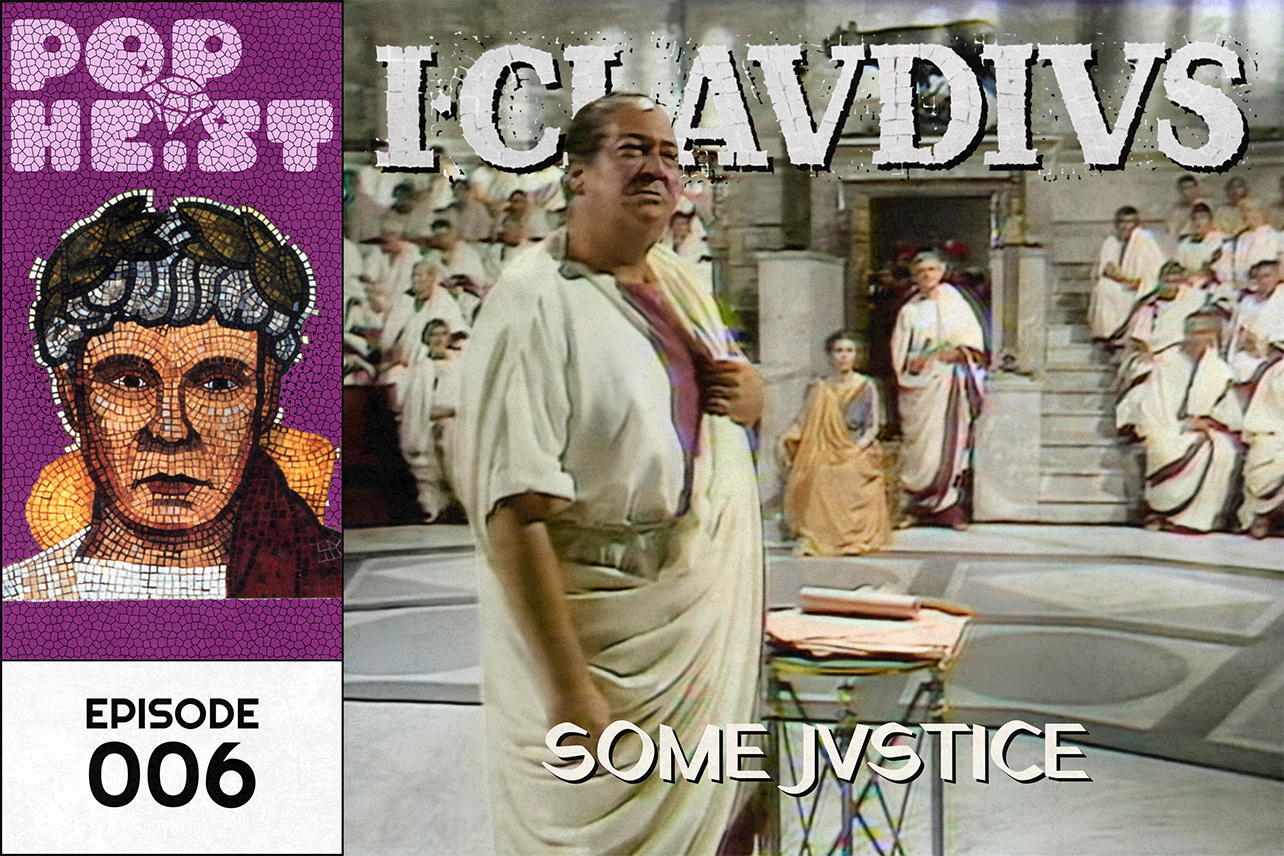In PRESTIGE PREHISTORY, Pop Heist critic Sean T. Collins takes a look at classic TV shows that paved the way for the New Golden Age of Television — challenging, self-contained series from writers and filmmakers determined to push the medium forward by telling stories their own way.
I, Claudius Episode 6
"Some Justice"
Original Airdate: Oct. 18, 1976
Writer: Jack Pulman (based on the novels I, Claudius and Claudius the God by Robert Graves)
Director: Herbert Wise
Cast: Derek Jacobi, Siân Phillips, George Baker, Patrick Stewart, Fiona Walker, Margaret Tyzack, James Faulkner, Kevin McNally, Stratford Johns, Irene Hamilton, Robert Morgan, Patsy Byrne
This isn't an episode. It's a flex. Not yet at its halfway mark, Jack Pulman and Herbert Wise's I, Claudius is showing off just how competent and capable it is at creating human drama out of nothing but a handful of fine actors, some effective costumes and cheap but evocative sets, and a script like virtually nothing television had ever seen.
For one thing, the show has jettisoned its third lead. Brian Blessed's Caesar Augustus is gone, having met his end the same way so many of his friends and would-be successors had done before him: poisoned at the hand of his wife, Livia. Tiberius is now Emperor of Rome, a title used more frequently and explicitly this episode than in the previous five combined. It seems everyone has stopped pretending that the Republic still lives.
It certainly no longer lives in the form of Germanicus, Claudius' brother and the last great hope for Republicanism in the Empire. A longtime favorite of both the late Augustus and the Roman people — to say nothing of Claudius, who adores the man as his oldest and best friend — he is, you guessed it, poisoned while maintaining his post in Syria. A superstitious man, he was hounded into paranoia by a variety of grotesque items placed around his home, from a dead baby with a shattered chest and horns on its head to an ass's skull with his name written on it to a dead cat with wings on its back to (an extremely racist caricature of) an African man's severed head with a white man's hand in its mouth.

It's not clear if these were meant to be real or the obvious mock-ups they appear to be on camera, but either way, the stress, combined with the poison, was too much for him. His aggrieved wife, Agrippina (Fiona Walker), is not about to let him go gently into that good night, either. Arranging a funeral procession all the way back to Rome, she loudly proclaims Germanicus' death murder by poison and witchery. She places the blame at the feet of Gnaeus Calpurnius Piso (Stratford Johns), a windbag politician who disliked Germanicus, and his wife Plancina (Irene Hamilton).
But she doesn't stop there. In a meeting with several trusted allies, including Claudius, his brother-in-law Castor (Kevin McNally), his friend Herod Agrippa, and his mother Antonia, Agrippina details the witchcraft and places the blame for the poisoning directly on Emperor Tiberius and his mother, Livia. There's briefly some pushback on the idea that an Emperor of Rome would stoop so low, before it's pointed out that that's the level he thrives on.
He's got plenty of help, of course. In a hilarious scene that the Agrippina conspiracy mirrors, Tiberius, Livia, and their chief enforcer Sejanus have a little chat about Germanicus' death and their political vulnerability over it. It's a scene straight out of Super Friends, with these three functioning as the constantly bickering Legion of Doom.

Tiberius, who still resents Germanicus because the troops would have made him Emperor over Tiberius had he accepted the job, can't understand why the mob is so angry at him over Germanicus' death. "They always preferred him to me," he grouses. "Why?"
"You just don't have a lovable nature," Livia says matter of factly.
A few minutes later, Tiberius returns to the issue. "Has it ever occurred to you, Mother, that it's you they hate and not me?"
"There is nothing in this world that occurs to you that has not occurred to me first," Livia retorts, exiting. "That is the affliction I live with." This woman has a way with words that would make Pusha T back down.
The real flexing, however, comes in the form of the three new characters on whom the rest of the story centers, and the three performers portraying them, none of whom will be seen on the show again.
First, and probably foremost if you know anything about the history of perverts, is Caligula (Robert Young), one of Germanicus and Agrippina's kids. He is — let me check how I put it in my notes…ah yes — a weird little bastard. He's a mama's boy who has strange, ominous nightmares about being covered with bats. He's a precociously sexual little imp who gets caught naked in bed with his own sister. And from the start, it's obvious he had something to do with how the various fetishes and statuettes and talismans and graffiti got into his late fathers' chambers, though we don't learn how or why till near the end.
The people around him react to his behavior in a variety of ways. Pina, as she's affectionately called by Claudius, can't see what he's becoming, especially now that she's bereft of the disciplining influence of the boy's father. Antonia is horrified and disgusted by the boy. Claudius, uncharacteristically unperceptive here, seems to see him as a naughty little scamp who just needs a good talking to. Livia is the one character who learns the full truth about him, and thus comes to the most correct assessment (though Antonia gets there too).

In a riot of a scene, we find out quite unexpectedly that Martina (Patsy Byrne), a Syrian (with a Yorkshire accent) who was hired to conduct the poisoning, has been removed from protective custody not by Sejanus, who's on the hunt in order to silence her, but by Livia, who tracked her down before her son's resident Stephen Miller could do so himself. The two women eat snacks and drink wine and talk shop about poison; Livia proves so knowledgeable that Martina expresses regret she's not able to practice her craft. "You'd be very good!" she enthuses.
"Thank you," Livia deadpans.
In the end it seems Livia may have practiced on Martina herself, in order to silence the pesky witness, but the old woman assures the poisoner it's just gas. "Do you seriously think that if I wanted to dispose of you, I'd stoop to doing it myself?"
But the main takeaway of the scene is that Martina was not alone in killing Germanicus. She had an inside man, or rather an inside boy: Caligula. Playing on the boy's malignant narcissism — he believes he is a god — Martina convinces him gods should be able to kill a man if they want to, and sets up Germanicus to take the fall. He placed the cursed artifacts and helped administer the poison, in part because he hated his father's strictness, in part just for fun. He's that kind of kid. Let's hope he never moves up the ladder, eh? Eh??
Despite his young age and limited range of affect, child actor Robert Young lights up the screen as Caligula, whose insanity and depravity radiate from him in waves that everyone else mistakes for mischief. You can believe this kid would both come running to his mommy from a nightmare, then try to burn the house down with everyone in it.

However, it's Johns and Hamilton who command the episode as Piso and Plancina, the grasping couple at the center of the firestorm. As portrayed by Johns, Piso is a gasbag in the classic self-important senator vein. He's all bug eyes and bluster, a lot of "They'll rue the day they crossed Gnaius Calpurnius Piso!", that kind of thing.
Plancina comes across as the more competent of the two, but even though she's sharper than her pompous spouse, Hamilton conveys both her pettiness — Germanicus died in part because he and Agrippina gave them bad seats at a feast once — and, before long, her growing realization that she and Piso have doomed themselves by meddling with people too powerful to be meddled with.
Sure enough, Tiberius cuts them loose. I'd say he's unhappy about it, but he's unhappy about literally everything. Primarily, his hand is forced by the mob, whose cries for vengeance will find an outlet one way or another. Better to throw them Piso and be done with it, the ruthless Sejanus suggests. The matter becomes particularly tricky when his own son, Castor, helps Claudius and Agrippina move Piso and Plancina's trial for murder and treason to the Senate rather than the courts. There, Tiberius must preside, and in effect stand trial with them.
The trial is a debacle. How could it not be? The judge, who is also the emperor, is an unindicted coconspirator who's actively trying to hunt down and kill the star witness. Everything depends on Piso's ability to strike just the right balance of obsequiousness and veiled threats; needless to say, he overbalances. He produces letters bearing the Imperial seal that provided him with instructions to try to take control in Syria and brandishes them in the Senate, knowing only the Emperor himself can allow them to be read. He figures their existence is enough to send a message to the Senate about who was really calling the shots.
But Sejanus takes the letters back, leaving them without evidence. Piso pulls his last card — a letter directly from Livia, unsealed, implicating both her and Tiberius in the murder scheme. Tiberius, who had no idea Livia had done this, is so shocked he does a comical jaw-dropped, mouth-agape take in response that's one of the funniest things the show has ever done. (Emperor Claudius ends this episode by falling asleep on the shitter, too, lest you think everything is grim and gritty around here.)

But even in the face of this damning new evidence, Tiberius refuses to budge, too afraid of the mob to allow Piso to live.
But this is Ancient Rome, and there are ways to preserve your family honor and wealth when you're accused of betraying the Empire; it's better to fall on your sword than wait for the executioner's to swing. Plancina begs Piso to take his own life, and ultimately offers to end hers with it. Though she'd initially tried to separate their fates, she realizes now she couldn't bear to live without him. These are not good people, they're murderous tyrants, but Stratford and Hamilton make them feel so passionately in love at this moment that it's breathtaking to behold.
Then Piso fucks it all up. With the knife at his wrist, he chickens out, insisting that Tiberius and Livia are bluffing and would never consent to letting him read that letter aloud, forcing an acquittal. It's a ludicrous fantasy born of cowardice. Disgusted and enraged, Plancina leaps up and grabs the knife herself. "I'll show you how a Roman should die!" she snarls.
But when a desperate Piso runs over to stop her, she turns, and the knife goes through his belly. Whether she really meant to go through with her suicide and this is a tragic accident, or whether it was her plan all along — she does live on without him after all — she wasn't lying. That is how a Roman should die, according to the customs. With Piso's "suicide," Plancina and her children get to keep the family fortune.
Beautifully blocked even by I, Claudius standards, this episode makes the most of the Senate's comparatively cavernous size, framing Piso pontificating in the foreground while Tiberius glowers beneath his imperial laurels in the back. Sejanus is constantly standing in the Emperor's personal space, indicating who really wears the pants in the relationship. Caligula is a sinister presence throughout, a Lynchian entity in child form, lurking in the crowd or in the rear of the frame.
And that final scene with Piso and Plancina, ugh, my god! Stratford and Hamilton's clinch, their desperate pressing of their heads and faces together as they resolve to die as one, is incandescently hot, the way doomed passion so often is. It makes Piso's decision to back down feel like even more of a slap in the face. Did you not watch the scene you are currently in, dog? You're caught in a bad romance, roll with it!

But Piso's uncertainty and terror are understandable. He now lives in a system where everything comes down to the decisions of a single man, a sovereign, a one-man maker of reality. Your safety as a Roman citizen, even a Roman Senator, ultimately depends not on laws or principles, but on remaining in the Emperor's good graces.Humanity struggled for centuries to crawl out of this kind of moral morass, in which liberty and freedom enter freefall as the whims of dictators reward friends and punish enemies with impunity. It's been recognized almost universally as evil for generation upon generation. I, Claudius was made for societies where, it was presumed, people agreed on this. But it's just as good, if not better, in a society where they don't.
This recap was originally accessible to paid subscribers only, and future recaps in this series are available now for paid subscribers. If you haven't already, consider supporting worker-owned media by subscribing to Pop Heist. We are ad-free and operating outside the algorithm, so all dollars go directly to paying the staff members and writers who make articles like this one possible.






